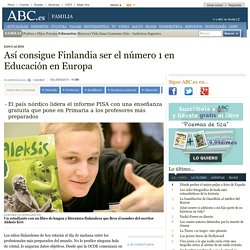

Journal of Online Learning Research. The Henry R. Kravis Prize in Nonprofit Leadership. Educasources. 5 Disruptive Education Trends. At the root of many American problems lies an ineffective and outdated education system that is failing our students.

Inequality and education have always been inextricably linked, and if we don’t fix education, we don’t fix inequality. Simply put, our citizens are not being prepared to compete in today’s global, hyper-connected economy, and, for low-income students, the outlook is especially grim. A recent Boston College study of 57 countries showed, among other unflattering comparisons, that only 7% of U.S. students (versus 48% of students in Singapore) reached the advanced level in eighth-grade math. Meanwhile, a 2012 Brookings study showed that "a whopping 43% of job openings require a bachelor’s degree or more. " Yet, only 30% of Americans and 15% of Latinos, our nation’s fastest growing demographic, have the credentials. Yet amidst all these gloomy statistics are rays of light. 1: Creating adaptive and optimized learning environments They aren’t alone.
Game Based Learning. Pittsburgh's Ed Tech Revolution. Generally when we talk about goals for educational technology, we talk about one of two things: improving access or improving effectiveness.

Rarely do we get an opportunity to talk credibly about an innovation that can move both of those needles at the same time. And yet, I saw just such innovation in Pittsburgh this week at the LearnLab Corporate Partners Meeting. LearnLab, jointly run by Carnegie Mellon University and the University of Pittsburgh, is not widely known in ed tech circles. However, it’s close cousin OLI is.
For example, an independent study by ITHAKA S+R made a splash when it showed OLI could cut instructional time in half and still achieve the same level of effectiveness. To sum up, OLI was able to teach more students at lower cost and with less time on task from the students yet with the same effectiveness of a traditional class. OLI is pretty well known in the broader ed tech community.
Cognitive Task Analysis Or is it? The downward jag is gone. This matters. Pittsburgh Learning Lab. Educational Reform in China. Shanghai in China displayed stunning results on the PISA 2009 assessment.

In mathematics, more than a quarter of Shanghai's 15-year-olds can conceptualize, generalize, and creatively use information based on their own investigations and modelling of complex problem situations. They can apply insight and understanding and develop new approaches and strategies when addressing novel situations. In the United States it is 2.5 percent and, on average in the industrialized world, it is still below 4 percent. But, like in the international Olympics, whenever China displays exceptional results there are skeptics who believe such results cannot possibly be produced in China's current economic and social context.
We have studied the PISA samples in Shanghai, and the ways in which the data were collected, carefully and found nothing that would cast doubt on those results. Quite in contrast to this stands the rather successful curriculum reform. NCAT.
Finlandia número 1 en Europa. El país nórdico lidera el informe PISA con una enseñanza gratuita que pone en Primaria a los profesores más preparados Los niños finlandeses de hoy estarán el día de mañana entre los profesionales más preparados del mundo.

No lo predice ninguna bola de cristal, lo auguran datos objetivos. Desde que la OCDE comenzara en el año 2000 a elaborar su informe PISA, Finlandia ha acaparado los primeros puestos del podio en Europa por su excelente nivel educativo. Apenas un 8% de los alumnos finlandeses no terminan sus estudios obligatorios (en España uno de cada tres jóvenes dejan sus estudios antes de acabar la enseñanza secundaria). Dispuesto a dar con la clave del éxito finlandés, el psicólogo escolar y entonces director del colegio Claret de Barcelona, Javier Melgarejo, comenzó a estudiar su sistema educativo hace más de una década. De maestros, los mejores La diferencia radica en la elevada calificación académica del profesorado en Finlandia, principalmente en educación primaria.
5 videos on connected learning.
Fundación Escuela Nueva.